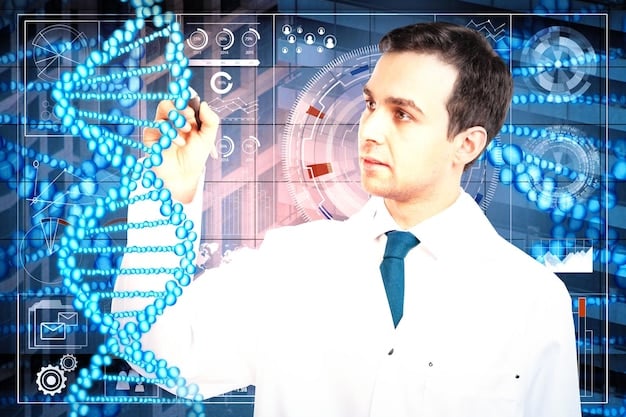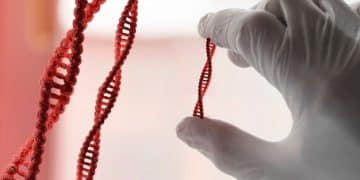US Biotech Events: Ethical Gene Editing Conference Guide

US Biotech Events focusing on gene editing ethical implications offer crucial insights into responsible innovation, featuring sessions that examine societal impacts, regulations, and future directions in biotechnology.
Navigating the complex landscape of gene editing requires a deep understanding of its ethical implications, something that US Biotech Events meticulously address through dedicated conference sessions and expert discussions.
Exploring the Landscape of US Biotech Events
US biotech events serve as critical platforms for scientists, ethicists, policymakers, and the public to converge and dissect the multifaceted challenges and opportunities presented by gene editing technologies. Understanding the array of these events is the first step in engaging responsibly with this rapidly evolving field.
These events are not mere showcases of scientific advancements; they also provide a space for robust dialogue on the responsible application of gene editing, addressing societal concerns, and shaping future regulations.
Key Types of Biotech Events
Various types of biotech events offer distinct perspectives on gene editing technologies and their ethical implications. These range from academic conferences to industry summits, each catering to different aspects of biotechnology.
- Academic Conferences: These typically focus on the latest research findings, providing an in-depth look at the scientific advancements in gene editing and their potential applications.
- Industry Summits: These events bring together biotech companies, investors, and other stakeholders to discuss the commercialization of gene editing technologies and the challenges of bringing these innovations to market.
- Policy Forums: These are crucial for discussing the regulatory landscape surrounding gene editing, involving policymakers, ethicists, and legal experts in conversations on how to govern these powerful tools.
Attending a variety of these events can provide a comprehensive understanding of gene editing, bridging the gap between scientific progress and ethical considerations.
Gene Editing Technologies: An Overview
Gene editing technologies have revolutionized biotechnology, offering unprecedented capabilities to modify DNA sequences. Understanding the basics of these technologies is essential for grasping the ethical implications discussed at US Biotech Events.
From correcting genetic defects to enhancing crop yields, gene editing tools promise to transform medicine, agriculture, and beyond. However, their potential impact also raises complex ethical questions.

CRISPR-Cas9: A Revolutionary Tool
CRISPR-Cas9, one of the most widely used gene editing technologies, allows scientists to precisely target and modify specific DNA sequences. Its simplicity and efficacy have made it a cornerstone of modern biotechnology.
The precision of CRISPR-Cas9 has expanded the possibilities of gene therapy, offering potential cures for genetic diseases that were once considered untreatable.
Ethical Considerations in Gene Editing
Gene editing technologies present complex ethical considerations, raising questions about the potential for unintended consequences, equitable access, and the alteration of the human germline. These issues are explored in depth at US Biotech Events.
- Potential for Off-Target Effects: The risk of unintended modifications to the genome raises concerns about long-term health consequences.
- Equitable Access to Gene Editing Technologies: Ensuring that gene editing therapies are accessible to all, regardless of socioeconomic status, is a critical ethical challenge.
- Germline Editing and Heritability: The possibility of editing genes in reproductive cells raises profound questions about the potential for altering the human gene pool and the implications for future generations.
Careful consideration of these ethical factors is essential to ensuring that gene editing technologies are used responsibly and for the benefit of all humanity.
Ethical Implications: Why They Matter
The ethical implications of gene editing technologies are paramount, influencing every aspect of their development, regulation, and application. Addressing these considerations at events ensures a future where technology serves humanity responsibly.
From safeguarding individual rights to promoting social justice, ethical frameworks are essential for guiding the responsible use of gene editing technologies.

Societal Impacts of Gene Editing
Gene editing technologies have the potential to reshape society in profound ways, altering human health, agriculture, and even evolution. Understanding these potential impacts is critical for informed decision-making.
- Impact on Healthcare: Gene editing offers the potential to cure genetic diseases and improve human health but also raises questions about resource allocation and access.
- Agricultural Applications: Gene editing can enhance crop yields, improve nutritional content, and increase resistance to pests but also raises concerns about biodiversity and environmental impacts.
- Evolutionary Consequences: Germline editing raises the possibility of altering the human gene pool, with uncertain consequences for future generations.
Open and inclusive dialogue at events is essential to ensure that gene editing technologies are used in ways that align with societal values and promote the common good.
Navigating Conference Sessions: What to Expect
Attending conference sessions at US Biotech Events is an excellent way to stay informed about the latest advancements in gene editing and engage with ethical discussions. Understanding what to expect can enhance the experience and ensure that you get the most out of these opportunities.
From keynote speeches to panel discussions, conference sessions offer a variety of formats for exploring the complexities of gene editing.
Preparing for Conference Sessions
Before attending conference sessions, it is helpful to familiarize yourself with the topics being discussed, the speakers, and the overall goals of the event. This preparation can enhance your understanding and allow you to participate more effectively.
Review the agenda, identify sessions that align with your interests, and come prepared with questions for the speakers and panelists.
Engaging with Speakers and Panelists
One of the most valuable aspects of attending conference sessions is the opportunity to engage with experts in the field. Asking questions, sharing insights, and networking with other attendees can broaden your perspective and deepen your understanding of gene editing.
Be respectful, listen attentively, and contribute thoughtfully to the discussions.
Case Studies: Ethical Dilemmas in Gene Editing
Examining specific case studies can provide valuable insights into the ethical dilemmas surrounding gene editing. These real-world examples illustrate the complexities of translating scientific advancements into practical applications.
From the use of CRISPR-Cas9 in human embryos to the development of genetically modified crops, case studies offer a concrete context for ethical analysis and decision-making.
The Case of CRISPR Babies
The birth of CRISPR-edited babies in China sparked global outrage and highlighted the urgent need for ethical guidelines and regulations governing the use of gene editing in human reproduction. This case underscores the potential for misuse and the importance of international cooperation.
The implications of germline editing for future generations are profound, raising questions about consent, safety, and the potential for unintended consequences.
Gene Editing in Agriculture: Balancing Benefits and Risks
The use of gene editing to enhance crop yields and improve nutritional content offers the potential to address global food security challenges. However, it also raises concerns about biodiversity, environmental impacts, and the control of the food supply.
Careful risk assessments, transparent labeling, and inclusive stakeholder engagement are essential to ensure that gene editing in agriculture is used responsibly and sustainably.
Shaping the Future: Responsible Innovation
The future of gene editing hinges on responsible innovation, balancing scientific progress with ethical considerations, societal values, and regulatory frameworks. US Biotech Events play a vital role in shaping this future by fostering dialogue, collaboration, and informed decision-making.
By embracing transparency, inclusivity, and a commitment to the common good, we can harness the potential of gene editing to improve human health, enhance food security, and address global challenges.
The Role of Public Engagement
Public engagement is essential for building trust, fostering understanding, and ensuring that gene editing technologies are used in ways that align with societal values.
- Education and Outreach: Providing accurate and accessible information about gene editing can empower the public to make informed decisions.
- Stakeholder Dialogue: Engaging with diverse stakeholders, including scientists, ethicists, policymakers, and the public, can foster a shared understanding of the challenges and opportunities presented by gene editing.
- Participatory Governance: Involving the public in decision-making processes can ensure that gene editing technologies are used in ways that reflect societal priorities.
By promoting open and inclusive dialogue, we can shape a future where gene editing technologies are used responsibly and for the benefit of all humanity.
| Key Point | Brief Description |
|---|---|
| 🧬 CRISPR-Cas9 | Revolutionary gene editing tool enabling precise DNA modifications. |
| 🤔 Ethical Concerns | Potential for off-target effects and equitable access to gene editing. |
| 🌍 Societal Impact | Gene editing’s influence on healthcare, agriculture, and human evolution. |
| 🤝 Public Engagement | Involving the public in decision-making ensures responsible gene editing use. |
Frequently Asked Questions
▼
Ethical concerns include off-target effects, equitable access to technologies, germline editing, and potential long-term health consequences. These issues are actively discussed at US Biotech Events.
▼
CRISPR-Cas9 is a gene editing technology that uses a guide RNA to target specific DNA sequences and an enzyme (Cas9) to cut and modify the DNA at that location.
▼
These events provide a platform for discussing advancements, ethical implications, and regulations in biotechnology, fostering collaboration and informed decision-making among stakeholders.
▼
Public engagement is essential for building trust, promoting understanding, and ensuring that gene editing technologies are used in ways that align with societal values and promote the common good.
▼
Gene editing can enhance crop yields, improve nutritional content, and increase resistance to pests, offering potential solutions to global food security challenges. However, ethical considerations must be addressed.
Conclusion
Attending US Biotech Events offers a unique opportunity to engage with the critical dialogues surrounding gene editing technologies and their ethical implications. By understanding the technologies, exploring ethical considerations, and participating in public engagement, we can collectively shape a future where gene editing is used responsibly and for the benefit of all.





